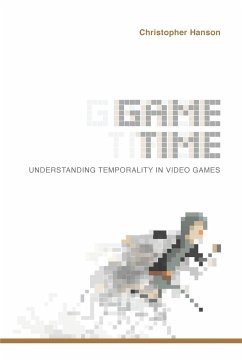Preserving, pausing, slowing, rewinding, replaying, reactivating, reanimating. . . . Has the ability to manipulate video game timelines altered our cultural conceptions of time? Video game scholar Christopher Hanson argues that the mechanics of time in digital games have presented a new model for understanding time in contemporary culture, a concept he calls game time. Multivalent in nature, game time is characterized by apparent malleability, navigability, and possibility while simultaneously being highly restrictive and requiring replay and repetition. Hanson demonstrates that compared to analog tabletop games, sports, film, television, and other forms of media, the temporal structures of digital games provide unique opportunities to engage players with liveness, causality, potentiality, and lived experience that create new ways of experiencing time. Hanson's argument features comparative analysis of key video games titles including Braid, Quantum Break, Battle of the Bulge, Prince of Persia: The Sands of Time, Passage, The Legend of Zelda: The Ocarina of Time, Lifeline, and A Dark Room.
Hinweis: Dieser Artikel kann nur an eine deutsche Lieferadresse ausgeliefert werden.
Hinweis: Dieser Artikel kann nur an eine deutsche Lieferadresse ausgeliefert werden.








